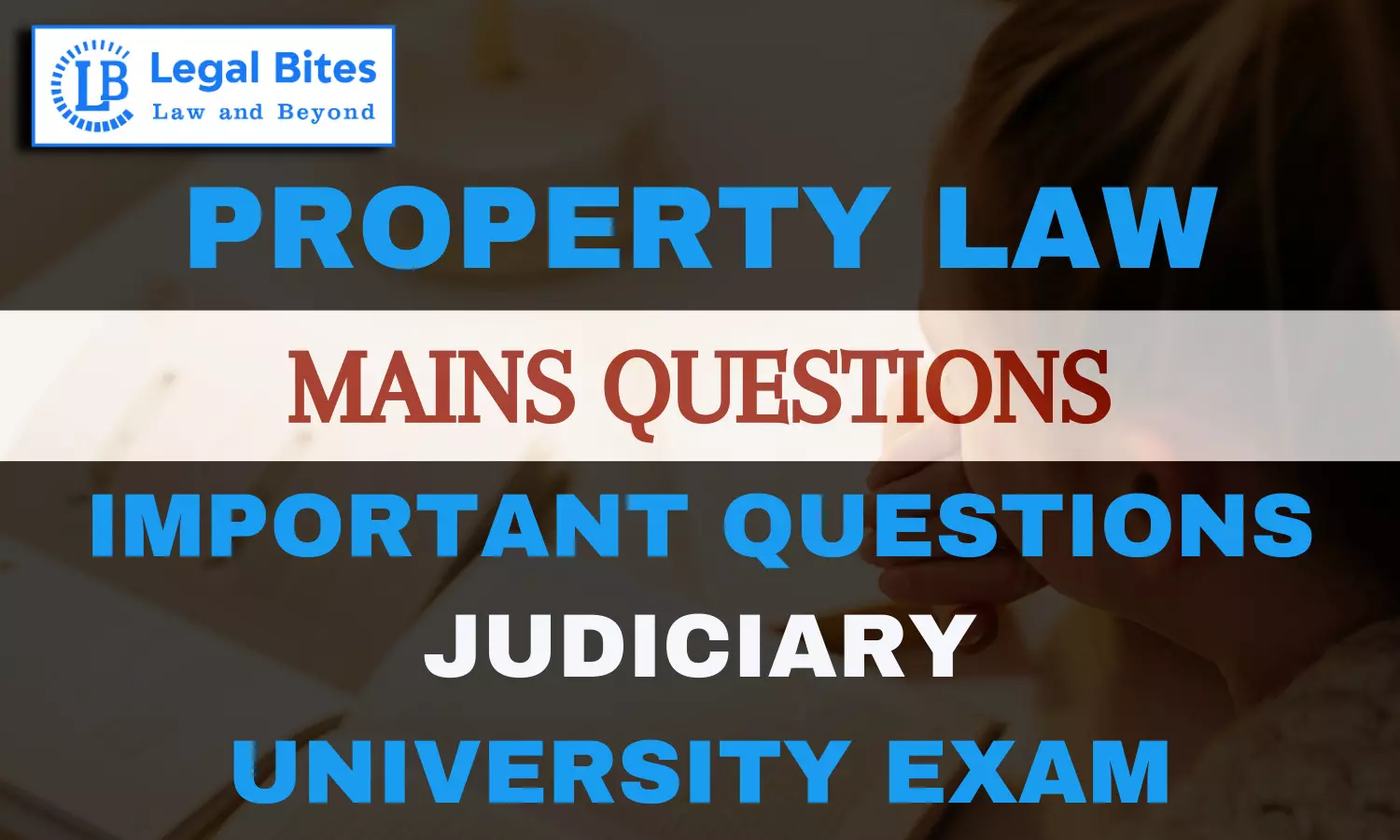Property Law Question Answer Series 2: Important Questions for Exams | Part – II
Legal Bites presents Property Law Important Question-Answer Series

Legal Bites presents Property Law Important Question-Answer Series. The questions listed here will help students study for various Competitive and University Exams. Candidates can use Legal Bites' list of questions to help them determine the most important and often asked questions and practice their aptitude and knowledge.
Answering questions is a continuous process that is an inevitable component of any test preparation, as we all know. A well-written response displays not just a candidate's knowledge but also his or her ability to tailor the content to the question's requirements.
It is vital to prepare for this exam to pass it thoroughly. To attain mastery over the subjects studied, applicants only need to keep practising these questions in the months coming up to the examinations. Following it, the candidate's confidence level, as well as their scores, will vastly improve.
Property Law Question Answer Series 2: Important Questions for Exams | Part – II
Question 1
(i) Whether the family arrangement is transferred?
(ii) Whether surrender amounts to transfer?
(iii) Whether an Idol is a living person? [MPJS 2018]
Question 2
Though the Transfer of Property Act deals with transfer intervivos, yet an interest may be created in favour of an unborn person. Discuss. [BJS 2018]
Question 3
Under what circumstances conditional transfer of property under the Transfer of Property Act, 1882 becomes void? Discuss with reference to statutory provisions and case law. [Punj JS 2003]
Question 4
A transfers the ownership of certain lands to B, C and D by way of gift with a condition that they shall not divide the property for 10 years. Examine the validity of the condition. [BJS 1977]
Question 5
Explain in brief the various modes of the transfer of immovable property. How does a mortgage differ from a gift? [RJS 1992]
Question 6
"M" a member of a housing society purchases a plot and later on sells it to "D", a non-member. Under the bye-laws of the society, such transfer is not permitted. "M" claims that the bye-law of the society infringe Section 10 of the Transfer of Property Act. Decide. [UPJS 2012]
Question 7
Can a Pardanashin lady enter into a contract of transfer of property? Has the transferee to prove any facts to uphold such transaction in Court of Law? [UPJS 1982]
Question 8
Does the Transfer of Property Act make an exception to the general rule that a person cannot confer a better title to the property than he himself has in it? If so, how do you justify the exceptions? [UPJS 2013]
Question 9
“He who is prior in time is better in law.” Explain this statement. [UPJS 2023]
Question 10
In a Mutation case after the death of the husband a compromise was entered into between the widow and husband's brother that the widow would not make a transfer of the land to any on except her husband's brother and his heirs. The mutation was ordered without any condition. The widow sold the land to an outsider. Can this condition be enforced against the transferee? [UPJS 1982]
Question 11
During the pendency of a property dispute in a court of law, Mr. A purchases property from one of the parties involved in the litigation by knowing the fact that the said land is in dispute and the related case is pending in the court of law. The other party, Mr. B. objects to Mr. A's purchase, arguing that the doctrine of lis pendens prevents any new purchaser from having any rights until the suit is resolved. Mr. A, however, believes that as a new purchaser, he has a legitimate interest in the property and seeks to be impleaded in the ongoing suit to protect his rights. Based on the principles of the doctrine of lis pendens under Section 52 of the Transfer of Property Act, 1882, is Mr. A's request to be impleaded in the ongoing suit legally tenable? Can the doctrine of lis pendens bar him from being added as a party to the suit? Substantiate your answer by quoting the relevant legal principles, provisions and case-laws. [OJS 2023]
Question 12
A mother, fully aware of the implications, transferred a significant portion of her property to her stepson, through a gift deed. This transfer was executed with a complete understanding of its impact on her financial stability and the interests of her other heirs, particularly her biological son The biological son challenged the validity of the transfer, alleging that the mother was unduly influenced or lacked the capacity to make such a decision, and he is the sole heir of the property as a biological son. Discuss the relevant Sections of the Transfer of Property Act, 1882, and related legal principles that would apply to determine whether the gift deed is valid or voidable. Also, explain the validity of mother's intelligent transfer of property to her stepson with full appreciation of its effect over her interests. [OJS 2023]
Question 13
What are the different types of mortgages recognized under the Transfer of Property Act, 1882? Briefly explain the key characteristics of each type. [OJS 2023]

